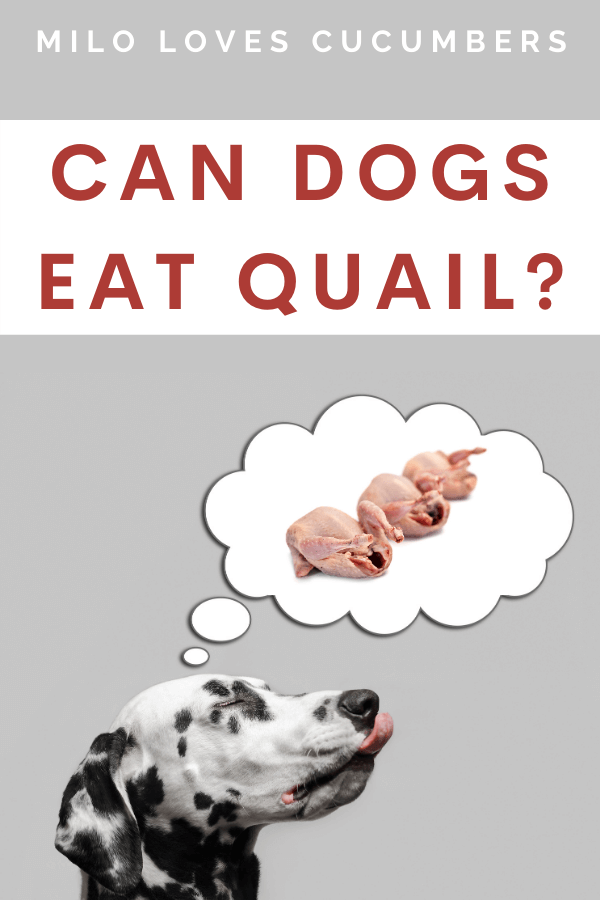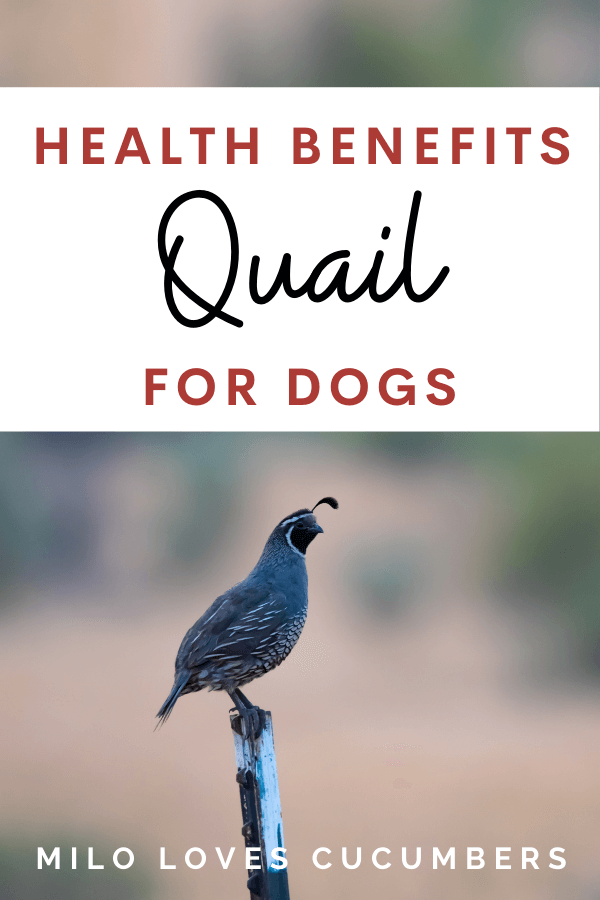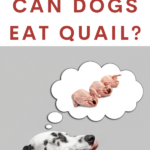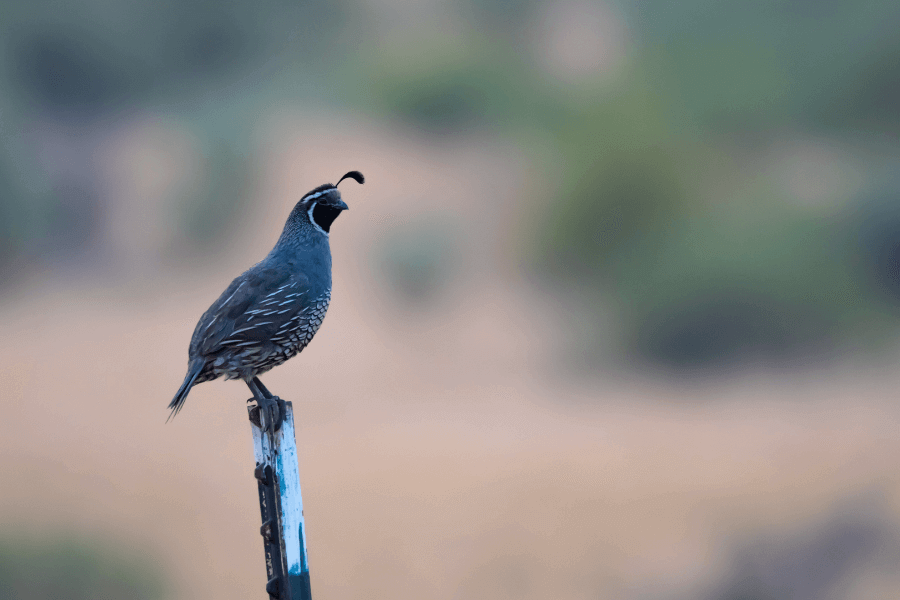The other day I was in the kitchen cooking and Milo ran to my side, waiting for any little bit of food to drop from the cutting board. Normally I’ll give him a piece of whatever meat I’m chopping up, but I wasn’t so sure this time – I was cooking roasted quail with quail egg garnich. So naturally I wondered, can dogs eat quail?
As it turns out, quail meat is an excellent source of protein for dogs and there is no harm in feeding your dog quail. When I did my research I noticed how healthy and nutritious quail meat and eggs are for dogs of all sizes.
Disclosure: This post may contain affiliate links. If you purchase a product through one of our affiliate links we make a small commission from the sale at no extra cost to our readers.
We raise our own quail meat on our property, so I was relieved to find that I would be able to supplement Milo’s diet with this delicious bird. Quail meat is a low-calorie protein which is lean and is full of vitamins. So if you are looking for new options and still haven’t tried feeding your pooch quail, now is the time to go for it!
Rich in Vitamin and Minerals
Quails are small birds which are part of the pheasant family. Quail meat is lean and low in calories. It is rich in protein and essential vitamins that help your dog to grow stronger. It is also high in other minerals such as phosphorus and iron which are essential for supporting strong muscle growth. Perfect for any active pup!
You’ll be amazed that quail meat and eggs have amazing health benefits for our fur babies. The nutrition provided boosts your dog’s energy immensely. This is because quail eggs are an amazing source of fat which forms the energy reserve in your dog’s body. The eggs are also high in iron which is very important for raising your dog’s energy.
The eggs are also high in riboflavin, also known as vitamin B2. All types of vitamin B present in quail eggs help keep our dog’s hair, eyes and skin healthy. Plus, it helps in the production of healthy red blood cells.
In fact, after I started supplementing Milo’s diet with quail meat and eggs, I have noticed that he has more energy and a shinier coat overall. I’m gathering that this is due to the increased nutritional value of the food, rather than just feeding him bagged food like before.
Quail Eggs for Dogs
Quail eggs are relatively small, but have amazing nutritional value. They are power-packed with amino acids and healthy vitamins like vitamin A, vitamin B12, vitamin B6 and vitamin E. They also consist of other minerals such as potassium, phosphorous, iron, zinc riboflavin, folate, fatty acids and selenium.
These minerals are very important for strengthening bones and muscles. In fact, one quail egg weighs around 1/5 the size of one chicken egg, but is stuffed with tons of vitamins and minerals – a perfect bite sized snack, no matter how big or small the dog!
Milo usually eats anywhere from 4-5 quail eggs, a few times per week, mixed in with his food. Not only does he gobble it up as fast as he can chew, but he also now stares at me when I’m cooking them for myself!
Clearly, he is taking the change to his diet very well!
Plus it’s perfectly safe to feed your pooch both raw and cooked eggs. Cooking by no means destroys the nutritional benefits of the egg so if you’d prefer to share your hard-boiled eggs, go for it! Just make sure you set boundaries, because he might want to take your breakfast too!
Also make sure that if you’re giving your dog raw eggs, they are washed and stored properly, and always come from a quality egg-source.
Quality of Quail
Quality is very important when it comes to purchasing quail or any type of eggs for your fur baby. Since it is such an inexpensive form of nutrition it is essential to get the best eggs available. And if you can’t find quail eggs at the supermarket, you can usually find them at smaller ethnic markets or farmers markets.
By buying quail eggs directly from the farm, you would know that the eggs are coming from healthy birds who are fed organic diets and are allowed to run in a natural habitat.
This guarantees that the eggs are not filled with harmful bacteria due to sick birds or dirty living areas.
Raising quails is even a better option as it removes any doubts that the quail meat and eggs are coming from healthy and organically fed birds. It provides your pup with the nutritional satisfaction he requires and gives you the mental satisfaction that the meat and eggs are safe, hygienic and organic.
Cooking Quail Meat
Ever since discovering what a great source of nutrition quail meat is for dogs, I’ve been supplementing Milo’s diet with this small, funny-looking bird. I usually feed it to him raw, to avoid having to remove the bones after since the quail bones are softer uncooked.
However, if you do decide to cook the quail meat before feeding it to your dog, remember not to add in too many extra ingredients that can upset your dog’s stomach. I normally stick to just baking the meat with a little salt and pepper to avoid any extra oil from the frying pan.
But of coure, you could opt for any number of ways to cook it. Other ways to prepare quail for dogs include on the grill, sautéed, and broiled.
After it’s done cooking, make sure to let it cool off before you debone the bird to separate the bones and meat.
Raw or Cooked Quail Bones
There are different schools of thought about whether quail, or any other bones for that matter, should be given to your dog. Then on top of that, the controversy of whether those bones should be raw or cooked comes into play.
I am one of those people who strongly advocate that bones should only be fed raw to your fur baby. Whenever I’m cooking meat I give Milo the raw bones to chew on. I never give him cooked bones, but of course all doggie parents have their own opinion on this.
Chewing on raw bones and connective tissues can develop a very efficient dental routine for your four-legged companion. It prevents the development of plaque and keeps their gums healthy and clean.
Oral diseases can be very painful which could lead to inflammation of gums and other persisting bacterial infections, which I would never want to imagine happening to my pup!
Feeding dogs cooked bones, on the flip side, can become very risky for your pooch. Bones can get stuck in their mouth or their intestines, piercing sensitive tissue due to splinters in the bone.
To avoid this it is best to choose small bones. Quail bones are small and easily chewable. While the bones of large animals such as pork, beef or lamb should be avoided as they can shatter the teeth.
Whenever feeding your dog raw bones, always look for any signs of distress such as constipation, vomiting, or diarrhea. And always consult your veterinarian before adding bones to your dog’s diet.
Will my dog get Salmonella from Quail Eggs?
Quail do not carry Salmonella. This is due to the quail’s overall body temperature being higher compared to that of a chicken. Quail also have more lysozyme enzyme in their bodies, which kills off harmful bacteria and prevents the quail from getting sick. Due to this, they don’t carry salmonella or pass it to their eggs.
How much quail egg should I feed my dog?
Quail eggs are special treats for your dog. A normal quail egg consists of only14 calories.. But of course, the normal serving size depends on several factors such as your dogs’ age, breed, size, weight, activity level and if he has any existing health issues.
Eggs should be fed to canines in moderation. Even though quail eggs are a wholesome source of nutrition for your dog it is important to remember that a healthy diet is that which is balanced.
Eggs should be fed as a nutritional bonus for your pooch. If you observe any digestive issues then that could be because you are feeding them too many eggs. In case of puppies that could mean the eggs have been added to quickly in their diet and you need to wait it out for a bit and reintroduce the quail eggs later.
Can dogs eat quail eggshells?
Yes, your dog can eat eggshells. The are a good source of calcium, and feeding your dog the whole egg, including the eggshell is a healthy supplement to their diet. The addition of quail and quail based food to your fur baby’s diet expands their choices of protein and also gives them the nutrition they require. It is a unique protein which has proven to be a good protein for those dogs who have allergies to other meat-based proteins such as pork, chicken or beef.
Pin it for later!




